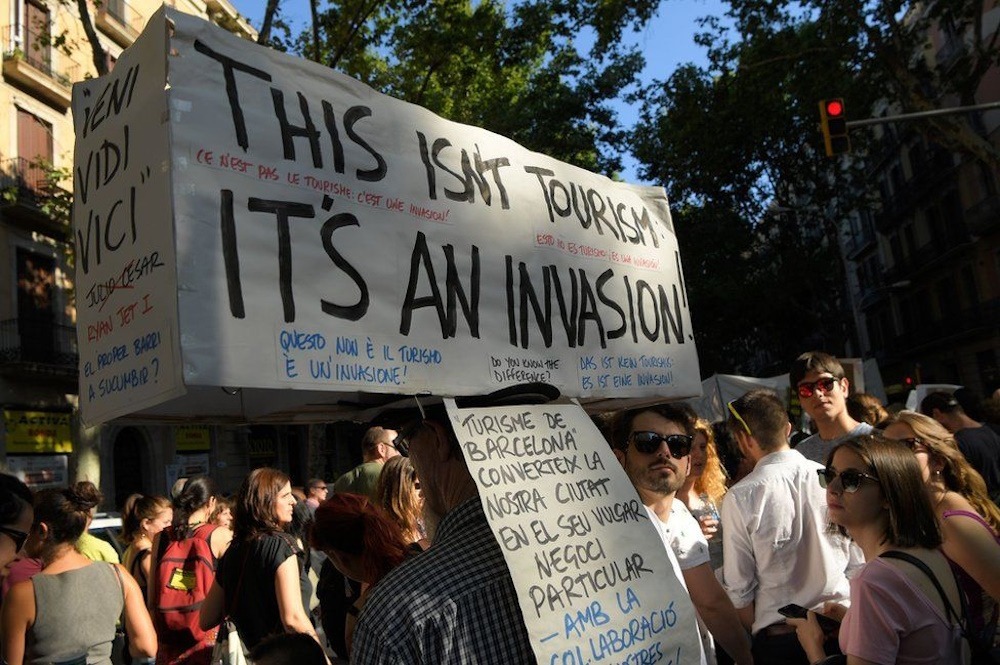Residents in Spain to tourists ‘stay away’

Visitors to popular European destinations have come across signs indicating that locals would prefer them to explore other areas.
Last week, a crowd of nearly 3,000 demonstrators made their way through La Rambla, the bustling tourism hub of this city. They used colorful squirt guns to spray people with water. The event quickly gained widespread attention on social media as videos of it went viral.
Despite the prominent protests, travel agents and hospitality companies report that there have not been widespread cancellations thus far. However, travelers planning a trip to Europe are now giving more consideration to their destination choices. According to visitors who have been to Barcelona and other cities, the protests and the rise in anti-tourist graffiti are impossible to overlook.
“We have a strong affinity for Barcelona, but if the city is contemplating measures to restrict tourism, it will certainly factor into our future plans,” expresses Val Gui, a 36-year-old executive from Boston who recently visited the city with his family.
Gui, who has an eight-month-old daughter, understands and relates to the experiences of locals. He resided in San Francisco as the cost of living in the city continued to rise.
During his time in Barcelona, he mentioned receiving excellent service from restaurant staff and business owners who were grateful for his family’s efforts to speak Spanish. He also felt somewhat unwelcome because of the abundance of graffiti that criticized travelers similar to him.
Extravagant Americans are playing a significant role in boosting economies across Southern Europe by taking advantage of a strong dollar during their vacations. According to data from the Spanish statistics agency INE, Spain saw a significant rise in international visitors in the first five months of this year. The number of travelers reached 33 million, marking a 13.6% increase compared to the previous year.
However, certain well-liked destinations are facing difficulties due to the overwhelming influx of tourists. Thousands of Spanish residents have also gathered in Málaga and the Canary Islands to express their concerns about the impact of mass tourism and the increasing costs of housing, as more properties are being converted into short-term rentals.
What tourists typically express
A few months back, Madison Smith, a 25-year-old, made a reservation for a month-long stay at an Airbnb in Barcelona. She intended to work remotely during the fall while staying there. After witnessing social-media videos of locals spraying water on diners, she began to question her decision.
Smith, a savvy consumer, opted for an Airbnb over a hotel due to the cost savings. She turned to Reddit to seek advice on whether she should cancel her trip, and received a variety of opinions.
She admits to experiencing some guilt and discomfort, which ultimately influenced her decision to alter her travel arrangements.
She has decided to stay in Madrid for now, with intentions to make a brief trip to Barcelona.
According to travel advisers such as Virgi Schiffino Kennedy from Lux Voyage, vacationers have been seeking her opinion on the current situation. She believes that every destination is multifaceted, with more to it than just a single narrative centered around protests. She strongly encourages people to explore these places for themselves.
Ane Cvetkova, 42, frequently visits Barcelona, her preferred city, from her residence in Skopje, North Macedonia. She has opted to stay in hostels due to the increase in costs for short-term rentals.
She understands the concerns of her local friends and believes that implementing regulations on daily cruises, addressing illegal Airbnb rentals, and controlling rent hikes by landlords are essential steps to take. “I have personally never experienced any sense of unwelcome or encountered any hostility from the locals,” she states.
The impact at a local level
Along the bustling street of La Rambla, numerous business owners refrained from sharing their thoughts on the protests or their potential economic consequences, wary of drawing attention from the demonstrators.
Susanna Corominas, a shop attendant at Torrons Vicens—which sells chocolates and traditional Spanish sweets—expresses her disapproval of demonstrators spraying tourists with water. However, she mentions that visitors to the store from out-of-town have not raised this issue.
“I don’t observe any discernible effect of the protests on local businesses,” she states. Some individuals have expressed their dissatisfaction with the high level of congestion in this particular location.
Ariadna Cotén, one of the protest organizers, highlights the transformation of independent stores in Gracia, her neighborhood. These local businesses have been gradually replaced by establishments catering to foreign tourists, such as chains of specialized coffee shops and high-end restaurants.
Entry tickets are now required for nonresidents to visit Park Güell, one of Barcelona’s largest green spaces, due to its increasing popularity. Residents living near the park are now required to make reservations on an app as part of a crowd-reduction initiative.
Cotén states that her group does not have any intentions of organizing further demonstrations in Barcelona during the month of August. They have scheduled to resume them in September, coinciding with the America’s Cup sailing competition, which the city will be hosting until late October.
According to Mateu Hernández, director-general of Turisme de Barcelona, the authorities in Barcelona have reached a consensus that the continuous growth in the number of visitors should be limited.
Redirecting tourists towards less-crowded attractions and encouraging a greater appreciation for artistic and cultural offerings is a challenge the city faces, according to him.
“Barcelona has joined the ranks of cities like Amsterdam, Copenhagen, Oslo, Sydney, Seattle, Austin, Boston… that face the challenges that come with success,” he remarks.
Short-term rentals
Many residents in Barcelona and Málaga are expressing frustration, claiming that the increase in tourist housing has led to skyrocketing rental prices.
Last month, Barcelona Mayor Jaume Collboni announced that the city will not be renewing over 10,000 existing licenses for short-term rentals and will no longer be granting new ones. In an effort to increase the availability of long-term rentals for residents, Collboni aims to eliminate a profitable revenue stream for landlords. The tourist rentals are expected to be phased out by late 2028.
According to Airbnb, the issues of over tourism and housing challenges in Spain can be attributed to the long-standing dominance of hotel-driven mass tourism and a shortage of new housing. The company emphasizes that its platform only represents a small portion of the overall housing market in Spain.
According to James Ferrara, president of the InteleTravel agency, which has a network of 118,000 independent travel advisers, travel advisers are now considering their role in promoting certain places, in addition to the responsibility of local governments to manage these issues.
“It is imperative that we cease the practice of consistently sending individuals to the same 30 destinations across the globe,” he asserts.










